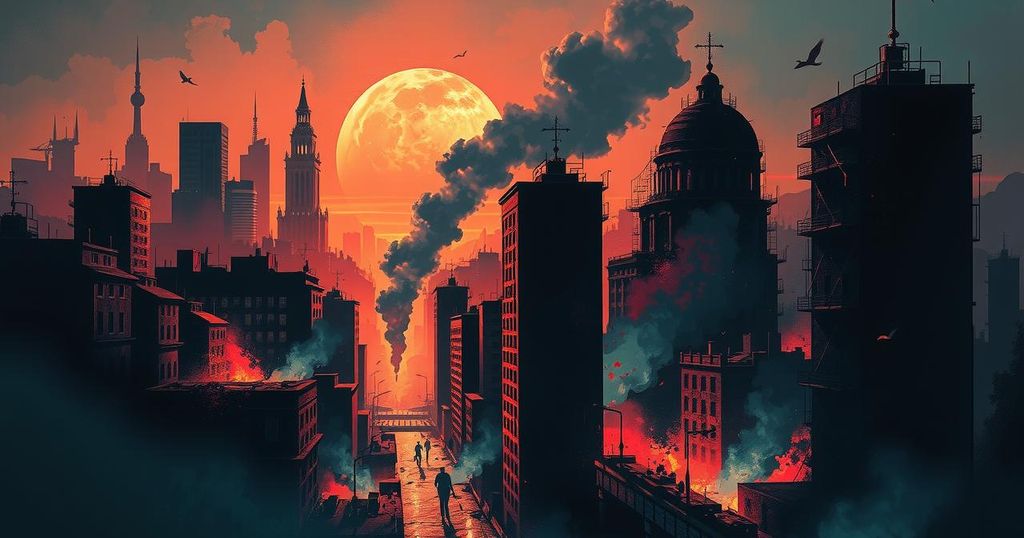Between Chaos and Democracy: Libya at a Crossroads Again

Libya’s capital Tripoli remains unstable despite a temporary calm. Recent violence erupted after Prime Minister Abdul Hamid Dbeibah ordered militia disbandment, leading to civilian casualties. Observers note a critical divide between rival eastern and western governments, with calls for elections intensifying amid unrest. The UN proposes several strategies for democratic progress, though significant challenges remain in achieving consensus among factions.
Tripoli is experiencing a temporary calm, but turmoil still reigns beneath the surface. Earlier this month, violence erupted as Prime Minister Abdul Hamid Dbeibah ordered the disbanding of armed militias, including the notorious Stabilization Support Apparatus (SSA), leading to firefights and the death of its head. Tragically, the UN reports that eight civilians lost their lives during this conflict.
The situation has become increasingly precarious. Hanan Salah, a researcher from Human Rights Watch, emphasized the reckless nature of the recent fighting, highlighting the armed groups’ blatant disregard for civilian life. The chaos is a reminder of Libya’s fragile state, particularly with armed factions active in civilian areas. This latest violence underscores the ongoing strife that Libya has been grappling with since being divided into two rival factions back in 2014.
Libya is effectively split between two governments: the Government of National Unity, led by Dbeibah in Tripoli, and the House of Representatives, headed by Ossama Hammad in Tobruk, supported by Khalifa Haftar. This division runs deep, with Haftar maintaining strict control over various militias in the east, while Dbeibah has allowed more competition among groups in the west. Observers suspect Dbeibah is now aiming to unify his control similar to Haftar’s model.
The recent fighting subsided after a few days with an undisclosed agreement. However, protests erupted soon after, with public calls for elections and a redrafting of Libya’s constitution, which had come to a halt following a failed peace process in December 2021. Many demonstrators also called for Dbeibah’s resignation, yet he did not address these demands directly in his speeches, instead emphasizing a crackdown on militia influence and corruption.
Tim Eaton from Chatham House noted that the Libyan conflict has been somewhat dormant recently as factions became entrenched—yet tensions remain high. The recent unrest around control of state institutions, particularly the lucrative telecommunications company, adds another layer of complexity. Eaton remarked on the palpable risk of reverting to civil war but also expressed cautionary optimism about the potential for political negotiations to reignite amidst the chaos.
Eaton pointed out that political change often follows significant upheaval—like in 2014 and 2020—and a similar scenario could be ripe for another shift in governance. While this month’s crisis might herald a chance for real political progress, Mohammed al-Dairi, a former foreign minister, suggested that forming a unified government should be the first priority to address Libya’s deep institutional divisions.
The United Nations Support Mission in Libya (UNSMIL), which debuted in 2011, has unveiled a new report outlining several strategies to navigate this tumultuous transitional phase towards elections. Options include simultaneous presidential and legislative elections or first conducting parliamentary elections before developing a permanent constitution. Alternatively, Libya could focus on establishing a political dialogue committee aimed at finalizing electoral laws.
Salah from HRW underlined that consensus among Libya’s factions is crucial. She cautioned that the journey towards conducting free and fair elections would not happen overnight, but highlighted that, despite the tough landscape, the competing parties might have few alternatives left. This moment could indeed pivot Libya towards a more stable and democratic future, but the path remains fraught with challenges.
In conclusion, Libya finds itself at a critical juncture as violence resurfaces amid calls for political reform and national unity. The government’s attempts to consolidate power amidst this turmoil demonstrate the complex landscape of armed groups operating throughout the country. While the recent unrest poses serious risks of renewed civil war, it also presents a unique opportunity for the UN and Libyan leaders to push for elections and a transition away from a fractured political reality. As observers keenly monitor the situation, the hope for a cohesive governance framework continues to linger, albeit precariously.
Original Source: www.dw.com








